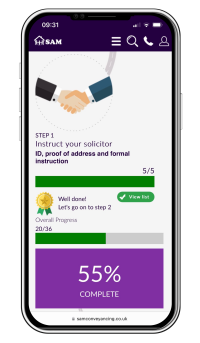What is the Land Transaction Tax in Wales?
Land transaction tax in Wales (previously known as Welsh stamp duty) is payable when you buy land or property. If it is your only property, you won't pay any tax on the amount up to the first threshold, unless you are buying as a company or a trust. You can use the above land transaction tax calculator to work out your liability using the current tax band rates.
The process for paying your land transaction tax is easy for buyers because your conveyancer or solicitor will normally do this for you. After completion, the solicitor files a Land Transaction Tax (LTT) Form with the Welsh Revenue Authority online (although some can still submit a paper submission). Even if there is no LTT liability, the solicitor is still required to file a tax return.
Any land transaction tax payable must be paid within 30 days after the completion date. If you are getting a mortgage, it is part of the mortgage lender's regulations that you transfer the funds for the land transaction tax to your solicitor before completion can take place. This means that you should be prepared to make payment to your solicitor for any land transaction tax liability the day before your completion date is set.
Are you buying a home in Wales?
Our conveyancing quotes are Fixed, No Sale No Fee, and kept competitive with our panel of specialist CQS-accredited solicitors. We also have local RICS surveyors to inspect your home for defects which may affect your purchase.
Trusted by thousands each year, you'll be in safe hands.

Fixed quote for our legal costs plus a budget-friendly breakdown of third-party disbursements.

Your sale or purchase is protected by our no sale, no fee guarantee.

Our panel solicitors are pre-approved to work with 99% of mortgage lenders in England & Wales.

Panel solicitors accredited by the Conveyancing Quality Scheme; regulated by the SRA.
How much is the land transaction tax in Wales?
In Wales, land transaction tax is paid at different rates, depending on whether the land/property is residential or non-residential or mixed use. The above Wales Stamp Duty Calculator should only be used for Residential land or property.
The main rates (see below) apply to most residential purchases, whether it is your first home, or (usually) if you are selling one to buy another. If you already own another residential property, you may be required to pay higher rates (see below) unless the new property is worth less than £40,000.
When companies buy residential properties, they must pay the higher rate. When trusts buy residential properties, they may have to pay the higher rate.
What are the main rates of Land Transaction Tax in Wales?
Transactions since 10 October 2022
Price Threshold | Main Rate |
The portion up to and including £225,000 | 0% |
The portion over £225,000 up to and including £400,000 | 6% |
The portion over £400,000 up to and including £750,000 | 7.5% |
The portion over £750,000 up to and including £1,500,000 | 10% |
The portion over £1,500,000 | 12% |
Source: Gov.Wales
What is the new stamp duty on additional property in Wales?
The higher rates of Land Transaction Tax, payable on additional properties, were increased on the 11th of December 2024:
Price Threshold | Higher Rate |
The portion up to and including £180,000 | 5% |
The portion over £180,000 up to and including £250,000 | 8.5% |
The portion over £250,000 up to and including £400,000 | 10% |
The portion over £400,000 up to and including £750,000 | 12.5% |
The portion over £750,000 up to and including £1,500,000 | 15% |
The portion over £1,500,000 | 17% |
Source: Gov.Wales
How is the Land Transaction Tax calculated?
Your LTT liability is calculated as a percentage of the consideration paid for the land or property. In most cases, it is the amount of money paid by the buyer to the seller for the property, including cash and mortgage funds.
For example, you buy your first residential home for £250,000. You pay LTT at 0% on the first £225,000, and at 6% on the portion from £225,000 to £250,000. 6% of £25,000 is £1,500.
However, consideration isn't always an exchange of money, it could also be:
- giving of goods (giving a personal possession in exchange for the land/property);
- providing works or services (giving work or a service in exchange for the land or property);
- release from a debt; and/or
- transfer of a debt, including the balance of an outstanding mortgage;
The amount of the consideration (for example, the value of the goods given) is the sum used to calculate the stamp duty/land transaction tax on. If you are looking to gift a property for no consideration read our article on Gifting Property, to see how it works differently between spouses, parents and children, and how Capital Gains Tax might be effected.
- online checklists
- videos
- free downloads
- useful tips








